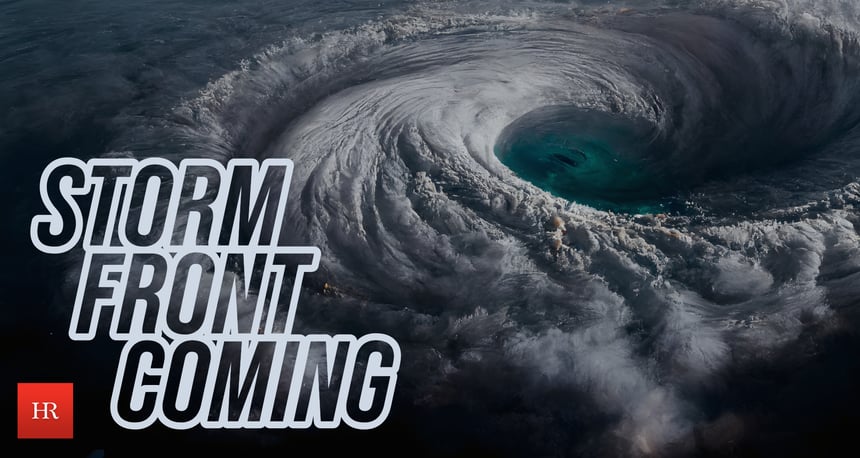With the return of “Roseanne” to the television airways this week, we prep for the Conner craziness...
Storm Front Coming: Why You Need an Inclement Weather Policy
 Yesterday, here along the Gulf Coast of the US, an outbreak of storms (wind, rain, tornado warnings), had us at heel before it moved along on its eastward swing.
Yesterday, here along the Gulf Coast of the US, an outbreak of storms (wind, rain, tornado warnings), had us at heel before it moved along on its eastward swing.
Personally, since we’re a remote-forward organization, I didn’t have much to worry about other than wondering if I would lose electricity and/or WiFi. (Naturally, because we pay heed to the local meteorologists, we also had our shelter-in-place room ready, made sure the generator was geared up, and laid in a supply of “storm snacks.”).
Yet, as I wandered about the internet and various discussion boards (WiFi survived!), I was once again struck by the number of companies that fail to plan for either inclement weather or other types of disasters that may befall their business operations.Rock You Like a Hurricane
On the business operations side it’s important to have a well-defined Disaster Recovery Plan; a working document that outlines what to do when the unexpected happens. The unexpected event could be a natural disaster (hurricane, flooding, wildfires) or something as traumatic as an incident of workplace violence or an active shooting. In addition to addressing business continuity and operations, the Disaster Recovery Plan also addresses employee-centric items such as communication, resources for staff, pay continuity, and plans to address individual situations and needs.
Ideally, you rarely (if ever) have to activate your Disaster Recovery Plan, but should be prepared to do so nonetheless. (Tip: regularly review the Plan and conduct an annual “tabletop exercise” with the leadership team to make sure all elements are current and applicable).
Stormy Weather
An inclement (severe, rough or harsh; stormy) weather policy, on the other hand, is one you may find yourself referring to regularly. Who among us hasn’t faced a seemingly “normal” weather phenomenon that gets out of hand? The April showers that promise to turn into 3+ inches of rain over just a few hours? The bomb-cyclone that threatens a densely populated geographic area?
“Sure,” we often think to ourselves, “we may get a big snow storm every few years, but we can handle that. We don’t need a POLICY about it.”
Until we can’t handle it.
Developing a policy (and a plan!) before you need one, will save lots of angst and aggravation for the time when you are, to put it mildly, thunderstruck. (gratuitous shoutout to AC/DC!)
Hazy Shade of Winter
Obviously, the ability for companies to fully shut down or institute a “work from home” day varies; health care facilities and hospitals are open regardless of the weather whereas an independent insurance agency with 15 employees can more readily tell everyone the “office” will be closed but employees should plan to work from home.
So how to develop your Inclement Weather policy? Here are just a few of the items you should evaluate, consider, and include:
- Define inclement weather. Does this include forecasted snow over xx amount? Will you take your cue from local government declarations (i.e. school or government closures)? You may also want to determine the difference between inclement weather and a natural disaster?
- Who will make the decision to close, delay opening or close early? Can an individual manager (of an office, team, or location) make that call or does it need to come from “corporate?” (CEO? HR Leader?)?
- Who will communicate this decision? Are the mechanisms in place to get the message delivered? While a companywide e-mail may work for some organizations, if you have a largely hourly workforce not everyone will have company email. Will you utilize SMS messaging or an old-fashioned “phone tree.” And how much notice, ideally, should be given?
- Are there jobs that must be performed (i.e. in person) regardless of inclement weather or closure? What are those jobs and who does them? What if that person is unavailable if, for example, they cannot leave their neighborhood due to impassable roadways?
- Can employees work from home? What if they CAN work from home but due to the weather, they lose electricity or internet access? Will they still be paid?
- How will you pay non-exempt employees if the business closes? Must they use PTO if they don’t report and can’t work from home? What if the non-exempt employee reports to work, the business closes…but the employee is unable to leave *due to weather) and continues to work? (note: make sure your policy is in compliance with both the Fair Labor Standards Act (FLSA) as well as any applicable state laws requiring payment of a minimum number of hours).
- How will you pay exempt employees? The US Department of Labor, in an opinion letter, clarified that ”If the employer closes operations due to a weather related emergency or other disaster for less than a full workweek, then the employer must pay an exempt employee “the full salary for any week in which the employee performs any work without regard to the number of days or hours worked,” because “deductions may not be made for time when work is not available.” (note: the opinion letter also addresses the situation when it may be appropriate to utilize accrued PTO however no “deduction” of pay may occur).
- Can employees use accrued PTO? What if they don’t have any accrued PTO? Consider the interplay of your Inclement Weather Policy with your PTO Policy and procedures. Evaluate if you are penalizing employees who have exhausted their PTO balance – especially when you may have a calendar year “use it or lose it” policy and the giant snowstorm hits the 3rd week of December.
Raindrops Keep Fallin’ On My Head
Whew!
It’s a lot to think about. And let’s face it - we often don’t develop an Inclement Weather Policy because we figure we’ll just deal with it when it happens.
But it happens. A lot.
And then, as HR professionals or business leaders, we scramble – while in the MIDST of the situation – to make decisions and answer questions that could have been memorialized (and communicated!) ahead of time.
Word of advice? Write that policy now…because Here Comes the Sun.



.png?height=200&name=Humareso%20Blog%20Posts-1-Year%20In%20Review%20(1).png)

Blog comments